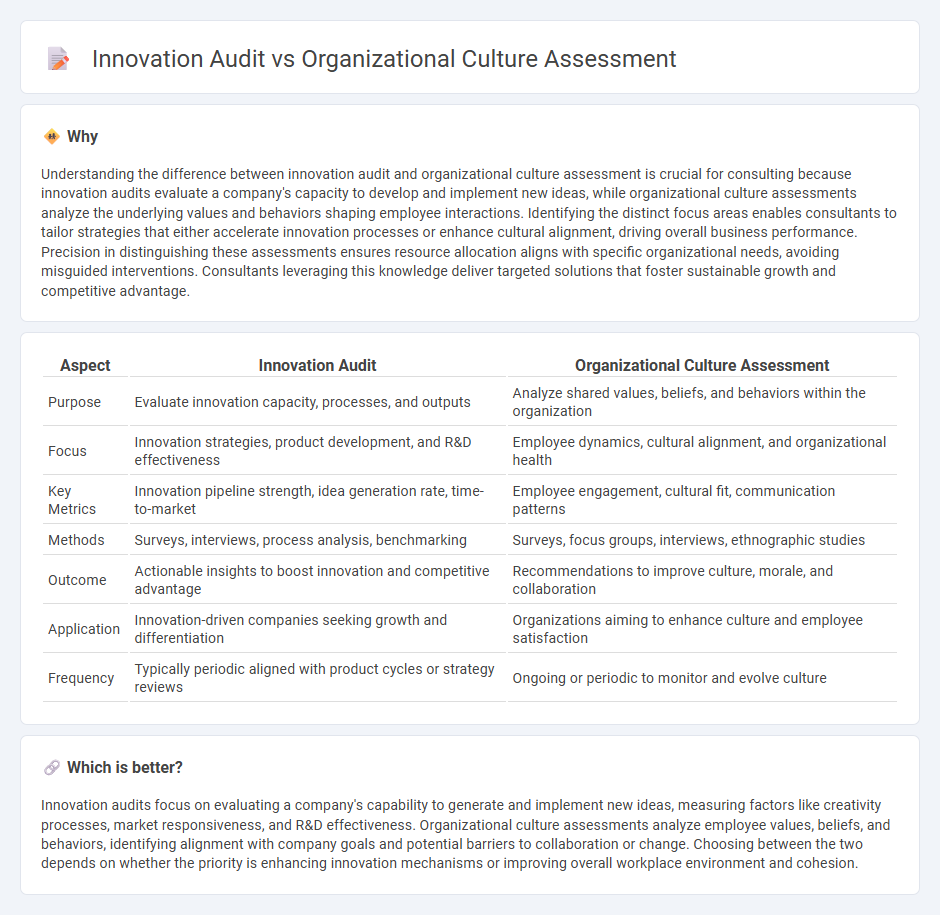
Innovation audits evaluate a company's processes, tools, and outcomes to identify gaps and opportunities for fostering creativity and technological advancement. Organizational culture assessments analyze employee values, behaviors, and communication patterns to determine how cultural dynamics support or hinder strategic goals. Discover how combining these approaches can drive transformational growth and enhance competitive advantage.
Why it is important
Understanding the difference between innovation audit and organizational culture assessment is crucial for consulting because innovation audits evaluate a company's capacity to develop and implement new ideas, while organizational culture assessments analyze the underlying values and behaviors shaping employee interactions. Identifying the distinct focus areas enables consultants to tailor strategies that either accelerate innovation processes or enhance cultural alignment, driving overall business performance. Precision in distinguishing these assessments ensures resource allocation aligns with specific organizational needs, avoiding misguided interventions. Consultants leveraging this knowledge deliver targeted solutions that foster sustainable growth and competitive advantage.
Comparison Table
| Aspect | Innovation Audit | Organizational Culture Assessment |
|---|---|---|
| Purpose | Evaluate innovation capacity, processes, and outputs | Analyze shared values, beliefs, and behaviors within the organization |
| Focus | Innovation strategies, product development, and R&D effectiveness | Employee dynamics, cultural alignment, and organizational health |
| Key Metrics | Innovation pipeline strength, idea generation rate, time-to-market | Employee engagement, cultural fit, communication patterns |
| Methods | Surveys, interviews, process analysis, benchmarking | Surveys, focus groups, interviews, ethnographic studies |
| Outcome | Actionable insights to boost innovation and competitive advantage | Recommendations to improve culture, morale, and collaboration |
| Application | Innovation-driven companies seeking growth and differentiation | Organizations aiming to enhance culture and employee satisfaction |
| Frequency | Typically periodic aligned with product cycles or strategy reviews | Ongoing or periodic to monitor and evolve culture |
Which is better?
Innovation audits focus on evaluating a company's capability to generate and implement new ideas, measuring factors like creativity processes, market responsiveness, and R&D effectiveness. Organizational culture assessments analyze employee values, beliefs, and behaviors, identifying alignment with company goals and potential barriers to collaboration or change. Choosing between the two depends on whether the priority is enhancing innovation mechanisms or improving overall workplace environment and cohesion.
Connection
Innovation audit identifies gaps and opportunities in a company's processes and resources, while organizational culture assessment evaluates shared values, behaviors, and mindset that influence innovation. Together, they reveal how cultural factors support or hinder innovative practices, enabling targeted strategies to foster a culture conducive to innovation. This alignment drives sustainable growth and competitive advantage by ensuring innovation initiatives resonate with the organizational environment.
Key Terms
**Organizational Culture Assessment:**
Organizational Culture Assessment examines shared values, beliefs, and behaviors shaping workplace environment and employee interactions, emphasizing alignment with company goals and adaptability to change. It identifies strengths and weaknesses in communication, collaboration, and leadership styles to foster a supportive and productive culture. Explore detailed insights on how Organizational Culture Assessment drives sustainable business success.
Values Alignment
Organizational culture assessment evaluates the alignment of core values, beliefs, and behaviors within a company to ensure a cohesive work environment and enhance employee engagement. Innovation audit, meanwhile, examines processes, resources, and organizational support to measure how effectively values related to creativity and risk-taking drive innovative outcomes. Discover the key differences and strategic impact of values alignment in boosting organizational performance.
Employee Engagement
Organizational culture assessment evaluates underlying values, beliefs, and behaviors influencing employee engagement, while innovation audit specifically measures how these cultural elements foster or hinder creativity and idea generation. Employee engagement metrics in a culture assessment reveal overall motivation and alignment with corporate mission, whereas an innovation audit pinpoints barriers and enablers for innovation-driven engagement. Discover how integrating both approaches can optimize workforce engagement and drive sustainable innovation in your organization.
Source and External Links
How to Measure Company Culture using the OCAI - The Organizational Culture Assessment Instrument (OCAI) is a widely used survey tool based on the Competing Values Framework that quantifies an organization's current and preferred culture across four archetypes, allowing data-driven strategy for cultural change.
Organizational Culture Assessment Instrument - Developed by Kim Cameron and Robert Quinn, the OCAI uses a questionnaire where respondents allocate 100 points among four culture types to create a validated profile of the organization's culture, highlighting dominant culture styles and areas for change.
17 Organizational Culture Survey Questions To Ask - Effective organizational culture assessments often involve tailored survey questions to capture employee perceptions on mission clarity, communication, transparency, and ethics, which are critical to understanding and improving workplace culture.
 dowidth.com
dowidth.com